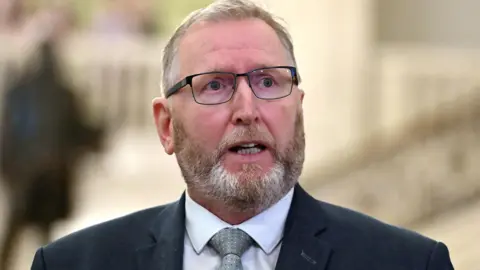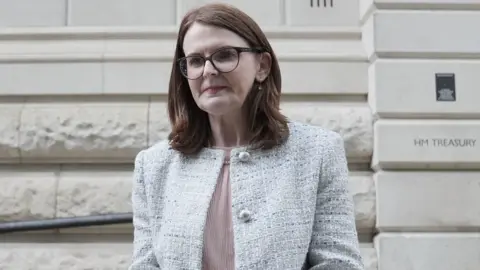John Campbell,BBC News NI Economics and Business Editor
 PA Media
PA MediaThe Ulster Unionist Party (UUP) will vote against Stormont’s budget when it is debated at the Assembly on Tuesday.
The party’s Health Minster Robin Swann opposed the budget when it was agreed by other executive ministers in April.
He said the health allocation was inadequate and would put people at risk of harm.
He has written to Stormont’s health committee warning that without additional funding his department will need to make “catastrophic” cuts.
The UUP wanted the Assembly debate to be postponed until after a budget re-allocation exercise which is due to happen next month.
When the finance minister, Sinn Féin’s Caoimhe Archibald, announced the budget in April she allocated about £15bn for day-to-day spending and £2bn for infrastructure and investment.
 PA
PASpeaking in the Assembly on Tuesday, she said it was “always going to be an incredibly challenging budget” for the executive.
“For every pound we had to allocate for day-to-day spending for public services, we had three times as many demands,” Ms Archibald added.
The Sinn Féin minister criticised the “austerity agenda” of the Conservative government, but said recent negotiations with the UK Treasury meant concerns on future funding levels for Northern Ireland could be “tempered”.
Also during the debate, the SDLP’s Matthew O’Toole said the budget was “not a plan” for the future.
The leader of the opposition added “there was no reason why this budget statement couldn’t have been a more strategic, forward-looking set of priorities for how the executive was going to go about making decisions.”
Budget ‘doesn’t prioritise health’
The Department of Health got the largest share of day-to-day funding (£7.8bn).
The next-largest allocations went to the Department of Education (£2.9bn) and the Department of Justice (£1.3bn).
The health budget was up by 6.3% compared to the opening position last year but was down by 2.3% when compared to what was actually spent by the end of last year.
 PA Media
PA MediaMr Swann said for that reason it was “a budget that doesn’t prioritise health, a budget that actually removes funding from the health service”.
He asked the health trusts to come up with cost saving plans which would allow his department to run a balanced budget and has now outlined the impact of those plans in a letter to the health committee.
He said that even after “extensive deep-dive savings measures” his department will overspend by £189m unless he imposes further cuts that would have “high and catastrophic impacts on essential services”.
He said the feedback from the trusts was “the most alarming advice I have received in my time as minister, outside of the COVID-19 pandemic”.
He described it as an irresponsible folly to expect health to run a breakeven budget on the basis of its current allocation.
 PA Media
PA MediaWhen the budget was announced, Deputy First Minister Emma Little-Pengelly, of the Democratic Unionist Party (DUP), said she understood Mr Swann’s concerns, but that there were other important priorities which required funding such as special educational needs.
There will be an additional £200m for the finance minister to distribute in a re-allocation exercise known as the June monitoring round.
That includes some money carried over from last year, additional money from Westminster and the start of a new ‘top-up’ procedure for Stormont’s budget which was agreed with the UK government.
The UUP leader Doug Beattie had wanted the budget debate to be postponed until after the monitoring round.
He said it had “the potential to ease some of the pressures we have highlighted in the existing health allocation”, adding that it “makes no sense for the Executive and Assembly to pass a budget that is almost certain to change within weeks”.

